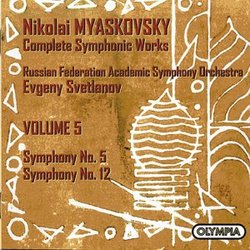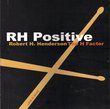| All Artists: Myaskovsky, Svetlanov, Russian Fed Academic So Title: Complete Symphonic Works 5 Members Wishing: 0 Total Copies: 0 Label: Olympia Release Date: 7/30/2002 Genre: Classical Styles: Historical Periods, Modern, 20th, & 21st Century, Symphonies Number of Discs: 1 SwapaCD Credits: 1 UPCs: 5015524407353, 515524407353 |
Search - Myaskovsky, Svetlanov, Russian Fed Academic So :: Complete Symphonic Works 5
 | Myaskovsky, Svetlanov, Russian Fed Academic So Complete Symphonic Works 5 Genre: Classical
|
Larger Image |
CD DetailsSimilar CDs
|
CD ReviewsAn Important Series of an Important yet underrated Soviet V. David A. Hollingsworth | Washington, DC USA | 11/27/2002 (5 out of 5 stars) "Myaskovsky's Fifth Symphony of 1918 was in fact the first symphony to be written on Soviet soil (not dismissing Lyapunov's nostalgic Second Symphony of 1917, which was written during Russia's transformation from the Tsarist Regime to the Communist state). And it was the first Symphony of the composer to be promoted outside Russia after the 1920 premiere by Nikolai Malko in Moscow. The mood of the Fifth is inward looking and reflective, with the beginning that is cool and in a sense pastoral. It is immediately accessible and engaging, while its harmonic language not drowned by the scoring (among Myaskovsky's weaknesses was his propensity in allowing his instrumentation to overshadow the essence of what he was saying). And while the middle of the first movement becomes rather intense and serious in temperament, the overall expression and thematic rhetoric is that of subtle Baxian philosophical characteristics that run counter to the turbulence of his previous symphonies, like the Third & Fourth. The second movement (Lento-Andante) carries on with where the previous movement left off, but noticeably more haunting and beautiful, but in ways that are disturbing and melancholic, with hints of contemplation (the climax is quite captivating here). But turn to the final two movements and mood becomes festive, somewhat in the manner of Gliere (the scherzi of his first two symphonies readily come to mind). Comparatively, Myaskovsky's Twelfth Symphony is more of historical importance than is it of high musical interest. By the time it was written by 1932 in "celebrating" the 15th Anniversary of the October Revolution, Myaskovsky chose for the objective musical expressionism rather than the subjective (by then, the dismantling of the Association of Contemporary Music, of which he was a founder-member and the increasing enforcement of Socialist Realist policies by the early 1930s left composers like Myaskovsky very little choice). It was the first symphony of Soviet topicality, specifically dealing with the Collective farms (hence its title "Kolkhoz") and it generated considerable stir especially in Moscow. But I cannot help but agreeing with Alexei Ikonnikov's finding that the themes of this symphony fall short of its subject (as the composer later admitted). Nevertheless, it was quite an achievement of the composer who was turning onto a different road map where his audience in Russia and abroad can relate to. Myaskovsky achieved something much greater in his next symphony, the Thirteenth, because of the depth and the inner struggles it represents when going onto that road map (while the composer was being honest and self-critical in the process). Performances altogether are strong and authoritative, although on the Fifth Symphony, Svetlanov's orchestra remains rather unpolished in comparison with the well-acclaimed Downes' 1992 Marco Polo recording with the BBC Philharmonic (which also have their highly ideal rendition of the Ninth). The strings and brass sections of the Russian Federation Symphony were surprisingly thinnish and ill-focused, truly below the orchestra's standards that helped made it into something of a legendary status and a source of aspirations for especially emerging orchestras in Russia and its immediate surroundings. But Svetlanov's approach to the Twelfth Symphony is in every way ideal and clearly outshines Stankovsky's rather flat and uninspired recording under the Marco Polo label. Recordings are muddled and congested, though not overwhelmingly distractive. Recommendable."
|

 Track Listings (7) - Disc #1
Track Listings (7) - Disc #1



